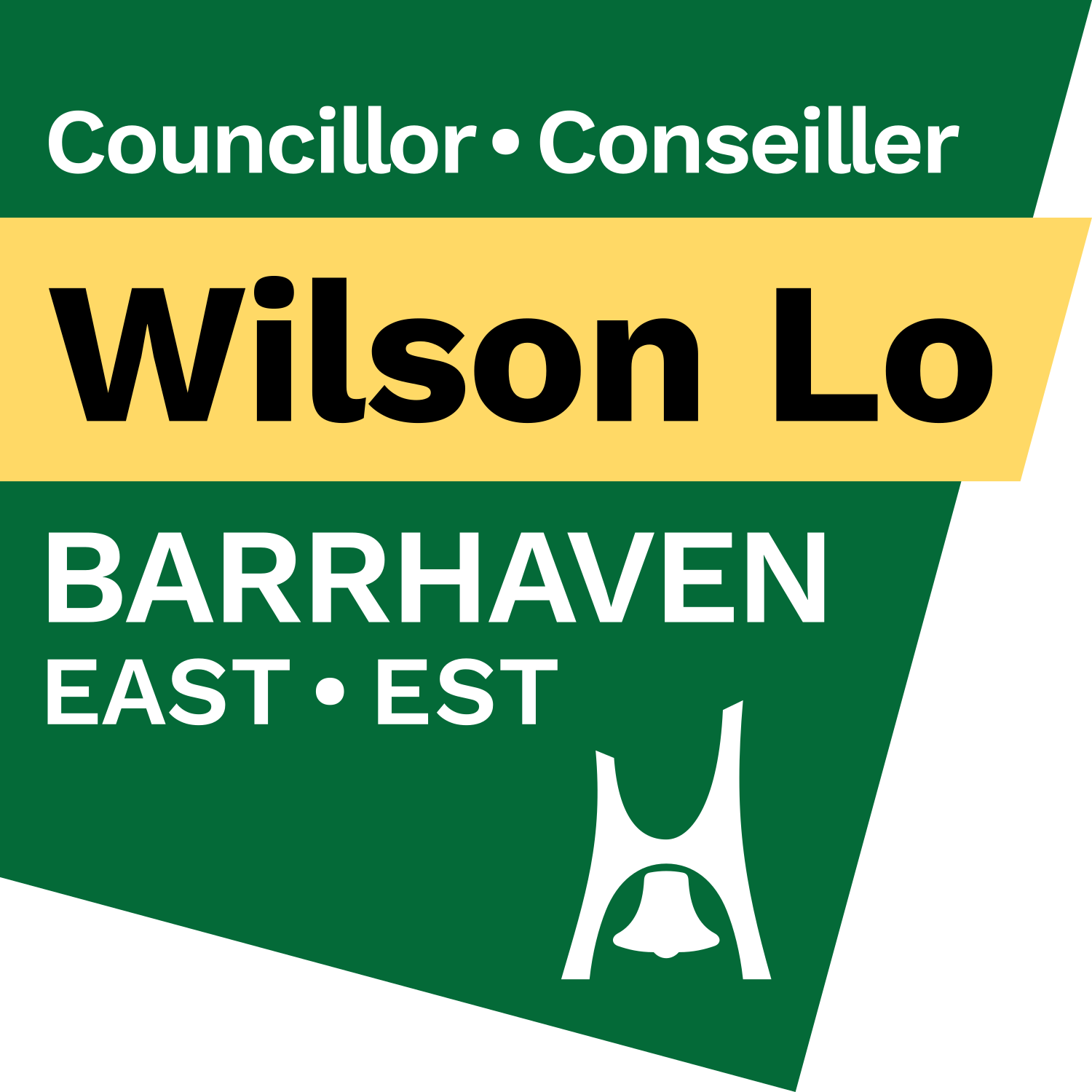Weekly newsletter: June 27, 2023
I took my dad to Niagara Falls over the weekend and showed him how much of a rebel I am.
Hi!
Some residents may know my father is visiting from Hong Kong until early-July. Though I’ve lived in Ottawa for almost 15 years and laid some relatively deep roots, it’s always fun to be a tourist in one’s own city! I’m most excited about renting kayaks with him to paddle the Rideau Canal.
Anyway, enough about me. Let’s talk about the updates to the Use and Care of Roads By-law which passed Transportation Committee last week.
Municipal roadways are bound by an area known as the right-of-way (RoW) abutting private properties. Generally, the RoW extends a few metres from the curb or road edge. Residents should refer to geoOttawa for property-specific data.
Within that RoW are utility assets like underground wires, gas lines, and telecommunications lines, among others. Utilities like Bell, Enbridge, and Hydro Ottawa have provincially legislated rights to access and use the City’s RoW.
Residents steward the RoW abutting their property, though municipal standards currently through the Use and Care of Roads By-law permit only grass in the non-driveway portions of the RoW. This means currently, gardens and lardscaping are not permitted past the property line towards the street.
Last week, the Transportation Committee voted in favour of a staff report to amend the by-law to permit residential gardening within the RoW up to the curb. The updates came following some controversy with a little library in Stittsville mid-2022.
Highlights in the report approved by committee include:
Permitting residential gardening up to the curb or road’s edge
Plants in the RoW are restricted to 75 centimetres in height for sightline considerations
Little libraries may be in the RoW with a 50-centimetre minimum setback
Hardscaping, planter boxes, and food production not permitted
Reactive enforcement only
Leading up to the Committee meeting, a few residents expressed concerns about some of the changes, mostly surrounding the height restriction and disallowing planter boxes and food production.
The original staff document actually included a metre setback for all plants from the curb, but that was amended to no setback following discussions I had with staff a few days prior to committee. Councillor Johnson also introduced a motion to eliminate the setback for streets with no curbs, which passed.
The height restriction of 75 centimetres was determined based on a scan of other municipalities that permit gardening in their RoW, taking sightline considerations from driveways and street corners into consideration.
Although some consideration was given to a gradual increase in height restriction for plants farther away from the curb/road edge, staff ultimately decided against it due to difficulties in consistently applying the by-law with those provisions.
Staff also state that there is general flexibility with plant heights, acknowledging different plants grow at different rates, and may vary slightly above and below the height limit.
One resident asked why the front yard fence by-law allows fences up to a metre tall while plants were restricted to 75 centimetres, but front yard fences are permitted on private property only.
Perhaps the most controversial item (based on feedback) was not allowing residents to grow food in the RoW, especially in the face of rising food insecurity and a general increase in interest for these initiatives.
During discussions, Ottawa Public Health asked for some time to undertake a fact-finding mission with Public Health Ontario and other municipalities to see if there are any ill effects of growing food so close to the road. Concerns included roadside emissions, road salt and spray, and potentially toxic fluids from the roadway.
The report is expected to be shared with Committee next year, although no firm timeline has been established due to the heavy involvement of semi-external partners.
The door is not closed on growing food in the RoW, but residents should note growing food continues to be permitted on private property.
Hardscaping and planter boxes were also a popular topic of discussion, including seasonal provisions to allow them during the warmer months. However, as utility work typically takes place during the warmer months, they would cause the city to run afoul of legislated access rights to utility assets in the RoW.
All in all, the discussion with staff, residents, and Council colleagues was productive and fulsome. Personally, prior to the discussions, I had little interest in the item given the general harmlessness of residents who already garden in the RoW and the lack of enforcement thereof.
Speaking of enforcement, the passage of these amendments does not mean by-law will drive around our community to actively seek out residents violating the current or updated Use and Care of Roads By-law. As is currently the case, enforcement will generally be responsive, such as if a utility or neighbour shares a concern.
Residents who garden put so much effort into beautifying their properties as well as their community. There are also several ecological benefits for pollinators as well. These amendments are a positive change in promoting such uses.
Aside from that, I hope everyone has an enjoyable Canada Day long weekend! Celebrate with your community at Clarke Fields Park with events for all ages from 8:30 am to 10:45 pm. Take note of the following:
No parking available on site, shuttle bus available from the Independent Grocer at Greenbank/Strandherd
Strandherd (between Jockvale and Kennevale) and Borrisokane (between Strandherd and Cambrian) will be closed on July 1, from 9:30 pm to 10:30 pm
Happy Canada Day, have a great week!


